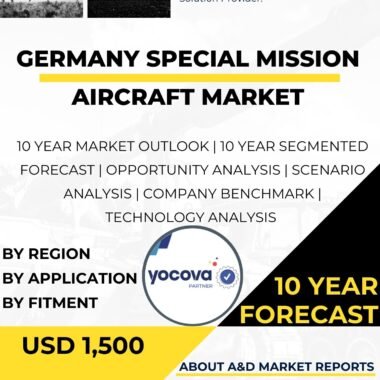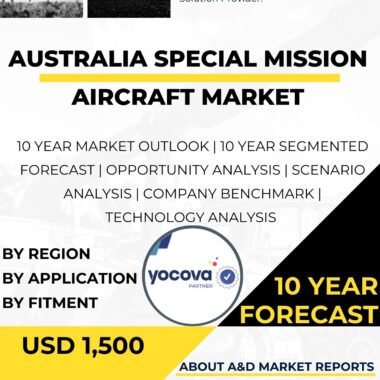Description
Introduction
Special mission aircraft Market form a crucial part of modern defense aviation, tailored for roles such as intelligence, surveillance, and reconnaissance (ISR), maritime patrol (MPA), aerial refueling, troop transport, and electronic warfare. These platforms allow armed forces to operate effectively in varied environments, from expansive rainforests to long coastlines. In Brazil, recognized as the world’s fifth-largest country by area and a significant player in South American geopolitics, the special mission aircraft market plays an essential role. With borders shared with ten countries and an Atlantic coastline exceeding 7,000 kilometers, Brazil confronts diverse security issues, including illegal logging in the Amazon, drug trafficking in the “Blue Amazon,” and potential disputes in the South Atlantic. As of October 2025, the Brazilian Air Force (FAB), Navy, and Army Aviation Command oversee a fleet of about 700 military aircraft, the largest in Latin America.
Key Drivers
Multiple elements fuel the Brazilian special mission aircraft market. A primary driver is maritime and border security. Brazil’s “Blue Amazon”—a 4.5 million square kilometer exclusive economic zone—experiences illicit operations, with 2025 INTERPOL data showing a 15% increase in high-seas piracy and narcotics smuggling. The FAB’s P-95 fleet, dating back to the 1990s, urgently needs replacement, leading to evaluations for sophisticated MPA versions. Environmental safeguarding in the Amazon also spurs demand. Deforestation rose 12% in 2024, requiring ISR tools for immediate oversight. The Army Aviation uses UH-60 Black Hawks and HA-1 Esquilo helicopters for ground ISR, but fixed-wing aircraft provide vital endurance for broad areas.
Major Players
Embraer holds a commanding position, utilizing its Gavião Peixoto facility to manufacture the KC-390, a twin-engine jet with a 26-ton payload capacity, aerial refueling, and ISR adaptability. In the third quarter of 2025, Embraer delivered 62 aircraft overall, including KC-390s to the FAB, reflecting a 5% year-on-year increase. The company’s Special Missions unit adapts platforms for surveillance and medical evacuation, using Brazil as the main proving ground. Global rivals include Lockheed Martin, which proposes C-130J variants, and Boeing, offering P-8 Poseidon options, though U.S. Offset Policy promotes collaborations with local entities. Sikorsky’s UH-60s lead in rotary-wing ISR for the Army, and Airbus Helicopters provides multi-mission Panthers to the Navy.
Technological Advancements
Innovation is central to the market’s competitive advantage. The December 2024 pact between Embraer and the FAB to create a C-390 MPA variant—outfitted with sonobuoys, anti-submarine torpedoes, and advanced radar—targets operational status by 2028. Portugal’s April 2025 cooperation extends this to ISR, incorporating AI for threat identification. Drone incorporation is accelerating; the FAB’s RQ-450 tests supplement manned aircraft, lowering expenses by 20%. Sustainable technologies, such as hybrid propulsion in Embraer’s prototypes, support Brazil’s eco-friendly defense initiatives. By 2026, projections suggest 30% of operations will use networked ISR, improving coordination with NATO partners. These developments not only enhance capabilities but also position Brazil as a tech innovator in the region.
Challenges
Even with positive prospects, obstacles remain. Budgetary limits hinder acquisitions; inflation cut 2% from the 2025 allocation. Supply chain issues from worldwide semiconductor shortages postpone upgrades, and demands for technology transfers complicate foreign agreements. Regulatory divisions among FAB branches also impede seamless integration. Addressing these will be key to realizing the market’s potential.
Future Outlook
By 2030, the market may double, powered by C-390 exports and MPA rollouts. Embraer’s proposals for agile combat employment (ACE) to the U.S. indicate broader international reach. With a 10.3% growth forecast for 2026, Brazil’s sector is poised to reinforce its leadership in the hemisphere. This trajectory highlights a balance of strategic needs and innovative growth.
Conclusion
Brazil’s special mission aircraft market exemplifies durability and vision, converting security demands into economic and technological gains. As Embraer continues to innovate, the country is steering toward a more secure and self-reliant future.




